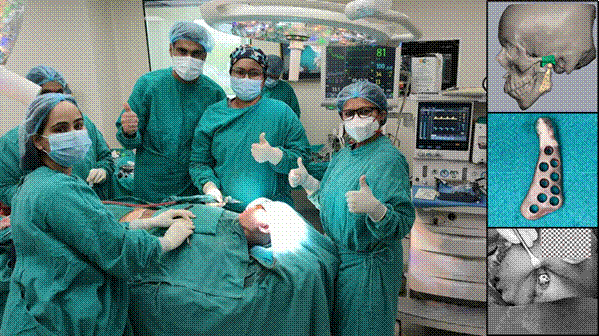India Achieves Breakthrough in Indigenous TMJ Implant Surgery at MAIDS, New Delhi
The TMJ implant innovation represents a major step in reducing dependence on imported implants while ensuring affordability, precision, and accessibility for Indian patients.

- Country:
- India
In a milestone achievement that reinforces India’s growing strength in indigenous medical technology, a team of surgeons at the Maulana Azad Institute of Dental Sciences (MAIDS), New Delhi, has successfully performed customized Temporo-Mandibular Joint (TMJ) implant surgeries on four patients, using implants entirely developed in India.
This landmark procedure marks a major leap forward in the country’s mission to achieve self-reliance in medical devices, aligning with Prime Minister Shri Narendra Modi’s vision of Atmanirbhar Bharat and Viksit Bharat 2047. The implants were developed as part of a collaborative initiative between the Indian Council of Medical Research (ICMR), the Department of Health Research (DHR), and IIT Delhi, under the MedTech Product Development Acceleration Gateway of India (mPRAGATI) program — a national platform accelerating innovation in healthcare technology.
Pioneering Indigenous Innovation in MedTech
The TMJ implant innovation represents a major step in reducing dependence on imported implants while ensuring affordability, precision, and accessibility for Indian patients. TMJ implants are critical in reconstructive jaw surgeries, helping patients with severe jaw joint deformities, trauma, or arthritis regain natural movement and facial function.
The implant was indigenously designed and developed at the ICMR-DHR MedTech Product Development Acceleration Gateway (mPRAGATI) — a cutting-edge research and development hub coordinated by the Medical Device and Diagnostics Mission Secretariat (MDMS) at IIT Delhi.
This breakthrough was supported by the Centre for Advanced Research (CAR) under ICMR, with clinical implementation at MAIDS, one of India’s premier dental institutions. The achievement showcases a synergistic model of translational medicine, where engineers, clinicians, and biomedical researchers collaborate to develop technologies that address real-world healthcare needs.
Leaders Applaud India’s MedTech Advancement
Union Minister for Health and Family Welfare, Shri J.P. Nadda, lauded the achievement as a transformative moment for India’s MedTech sector.
“The successful implantation of customized TMJ implants at MAIDS, supported by ICMR and mPRAGATI–IIT Delhi, reflects the growing strength of India’s medical technology ecosystem. This achievement shows how homegrown innovation, backed by strong research and policy support, can lead to affordable and impactful advances in healthcare,” he said.
ICMR Director General Dr. Rajiv Bahl also praised the accomplishment, emphasizing the power of multidisciplinary collaboration in driving healthcare innovation.
“This development highlights how partnerships between clinicians, engineers, and researchers can yield tangible health solutions. ICMR remains committed to supporting innovations that reduce costs, improve outcomes, and strengthen India’s position as a global leader in affordable healthcare technologies,” he noted.
Salient Features of the Indigenous TMJ Implant
The newly developed TMJ implant system offers several technical, economic, and operational advantages over imported devices, setting new standards for personalized medical implants in India.
1. Technical Advantage
-
Custom-Designed for Precision: Each implant is 3D-modeled to match the patient’s anatomy for optimal jaw function and alignment.
-
Enhanced Functionality: Includes dedicated features for muscle attachment, improving post-surgery jaw movement, aesthetics, and recovery.
-
Accelerated Healing: The biocompatible design minimizes post-operative complications and enhances rehabilitation outcomes.
2. Cost Advantage
-
Highly Affordable: Developed under the Make in India initiative, the indigenous TMJ implant costs nearly one-fifth the price of Indian industry-made versions and one-eighth to one-tenth of imported ones.
-
Accessible for All: This price reduction significantly broadens access to advanced reconstructive surgery for patients in public and private healthcare systems.
3. Timeline Advantage
-
Rapid Production and Delivery: Domestic manufacturing and digital workflow optimization have reduced turnaround time to approximately two weeks, compared to the several months typically required for imported systems.
-
Expedited Patient Care: Faster implant fabrication enables earlier intervention, reducing hospital stay and improving quality of life.
Translating Research into Real-World Healthcare
The success of the indigenous TMJ implant exemplifies the impact of ICMR-DHR-supported innovation platforms in bridging the gap between laboratory research and clinical application. It showcases India’s emerging strength in bioengineering, precision medicine, and healthcare technology localization.
The mPRAGATI program at IIT Delhi serves as a national accelerator for developing, validating, and scaling high-quality, affordable medical devices. It provides infrastructure, regulatory guidance, and clinical collaboration support, enabling innovators to bring advanced healthcare technologies to the market.
Through such initiatives, India is building a resilient MedTech ecosystem that not only addresses domestic healthcare needs but also contributes to the global supply chain of affordable medical innovations.
Clinical Success at MAIDS: A Model for India’s Healthcare Future
At MAIDS, New Delhi, the TMJ implant surgeries were conducted by a specialized maxillofacial surgery team equipped with state-of-the-art imaging and 3D-printing facilities. The procedures restored full jaw movement in all four patients, with excellent functional and aesthetic outcomes reported post-surgery.
The success underscores the capability of Indian clinicians to deploy advanced, indigenous technologies and the readiness of India’s healthcare infrastructure to adopt patient-specific, precision-engineered medical solutions.
The initiative has also set a benchmark for future customized implant designs, including those for orthopaedic, craniofacial, and dental applications — a step toward establishing India as a global hub for personalized medical device manufacturing.
Toward an Atmanirbhar and Viksit Bharat in Healthcare
This achievement aligns with the national mission to make India self-reliant in high-end medical technology, reducing dependence on costly imports while enhancing global competitiveness. It also contributes to the vision of “Heal in India, Heal by India”, integrating healthcare innovation with sustainable, equitable access.
By translating indigenous research into clinical success, institutions like ICMR, IIT Delhi, and MAIDS are collectively shaping a new era of Indian medical innovation — one rooted in collaboration, affordability, and excellence.
As India moves toward becoming a global innovation hub for medical devices, the success of the TMJ implant initiative stands as a testament to the country’s growing prowess in designing, developing, and deploying advanced health technologies for a healthier, self-reliant future.










